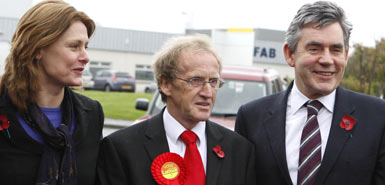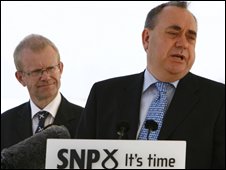If you thought that New Labour was socially illiberal, spare a thought for those above Berwick:
Scotland is considering a ban on alcohol sales to under-21s in a bid to make "the streets safer and communities better", Scotland's first minister, Alex Salmond, said today.
The SNP is considering the ban on alcohol sales outside pubs and clubs as part of its legislative programme for the year ahead.
This idea is the absolute worst of all worlds. It not only discriminates against those who are above the legal drinking age but don't especially want to go out of an evening, it also instantly means that those who are even over 21 have their legal right to buy alcohol potentially curtailed if they don't bother to carry ID around with them the entire time.
In any event, most stores already operate a scheme where those who look under 21 are required to take ID with them. This on its own prevents those who are borderline-18 from being able to drink, and it's much the same in pubs and clubs. The problem with underage drinking has not been with them buying it - but with their older friends and family, including their parents buying it for them. Additionally, now these schemes are being extended even further as the moral panic about binge drinking and general youth crime continues apace - some stores are now requiring all alcohol transactions, including by those who are clearly above the age limit, to be confirmed by ID. Others have raised the age limit to those who look younger than 25 requiring ID, and not because a distinct minority of those who drink are causing trouble, but due to the cravenness of politicians to the idea that something has to be done.
Which is exactly what this is. It's ludicrous because it still means that those under 21 can go and get smashed in a pub or a club and cause potentially just as much trouble either in the venue or outside of it on the way home, but that's somehow regarded as being less bothersome than a group of teenagers daring to drink either in suburban areas or somewhere where they might be seen other than in a town centre. The obvious unfairness in this is palpable, and it's because the young are partially regarded as an easy target that this can even be considered. As someone has already said, this means that a 20-year-old who wants to buy a bottle of wine to have with his girlfriend at home while they watch a film isn't able to, but that those who go out with the intention of getting paralytic are in no way hindered. It regards all those under 21 who buy from off-licences as morons who are potentially a danger to both themselves and others, while putting no imposition on happy hour promotions or other special drinks offers which encourage people to drink more.
Similarly daft is another potential policy also still in the bill - minimum price setting by unit of alcohol. You don't need to be a polymath to realise that this means drastically increasing the price of bottles of spirits, often drank in moderation and over time, if of course you're not now too young to be able to buy one from a supermarket or off-licence. The high-strength lagers and ciders are affected, but only slightly, and as a news article pointed out, it also doesn't affect the price of Buckfast, the tonic wine which like the so-called "alcopops" has been singled out for special attention by politicians that ought to know better.
To complete the trifecta of idiotic, ineffective and illiberal social policy, the SNP also want cigarettes to be taken off general display, lest anyone see the highly seductive sight of packets of fags with "YOU WILL DIE IF YOU SMOKE THIS" in huge bold lettering on them and think it'd be a pretty wizard idea to take up the habit. This really is almost beyond parody - it does nothing whatsoever to help those who already have the habit, except to make life more difficult for both the shop-keeper/assistant in getting the brand which you want and making it take longer while they dive under the counter as if they were selling you the latest animal porn shot in Bavaria featuring blonde German maidens swallowing horse cock. What it does do however is further stigmatise the smoker, as if they weren't already demonised and isolated enough due to their filthy habit. Rather than suggest to them that they really ought to give up, all this does is promote victim status, and quite rightly too, with the person even less likely to kick the habit.
While things have not got as bad for the drinker as the smoker and are unlikely ever to, it is the senseless drip-drip of measures, always attempting to out-do the last cure-all which deeply rankles with the average person who just wants to be left alone and treated like an adult when they dare to want to imbibe intoxicating liquor. If the SNP were serious and wanted to be something approaching fair, they would raise the age limit across the board on alcohol to 21. This though is already shown to be a complete joke in America, where it is completely unenforceable, just as it would be here, ostracising the under-21s from clubs and pubs where the majority tend to drink more sensibly, and instead pushing them towards house parties where the opposite is usually the case, where the alcohol has been purchased by those old enough or those who can get away with it.
There are two measures that will help with the attitude towards alcohol which the young increasingly are characterised as having: stop perpetuating the idea that all youngsters should abstain entirely until they are 18 and instead encourage families to introduce them to alcohol as they are growing up, and that includes not going over the top when the latest figures lead the tabloids into a frenzy over the increasing numbers of the young drinking however many units a week; or, alternatively, increase the tax on alcohol as a whole across the board proportionally according to market fluctuations, i.e. increase it when it's falling and reduce it when it's rising so that the price is stable but high, while discouraging the discounting and offers in both supermarkets and pubs/clubs. If it isn't obvious, my preferred option is the former. Fundamentally though, what also needs to be examined is exactly why so many in this country drink to get drunk or similar every weekend, which can't just be put down to our attitude towards alcohol and how it differs to on the continent. That might however involve the unpleasantness of examining the daily grind for the average person and how little there is that is otherwise offered in the way of pleasure, something which no politician can ever pretend to solve with the waving of a magical, populist, but completely draconian policy.Labels: alcohol, authoritarianism, idiocy, illiberalism, moral panics, Scotland, Scottish National Party




